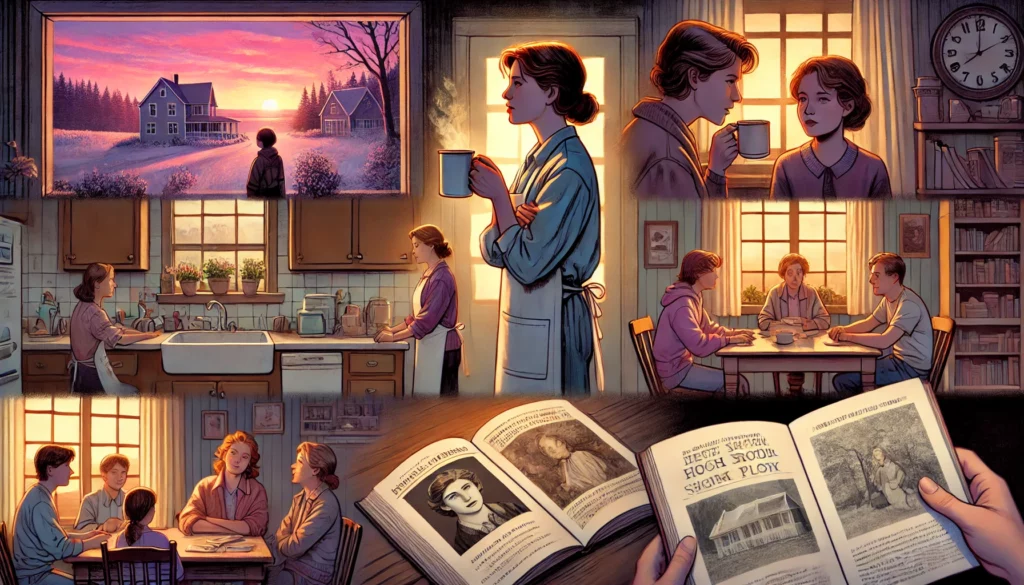In the tapestry of human experience, few threads are as transformative as forgiveness, resilience, and the courage to pursue one’s true path. These three stories explore the profound impact of second chances, the strength found in overcoming adversity, and the liberation that comes from letting go of long-held resentments, each offering a unique perspective on the power of the human spirit to triumph over life’s challenges.
The Bridge of Second Chances

Sarah stood at the edge of Oakwood Bridge, her fingers tracing the weathered wood of the railing. The creek below gurgled softly, a stark contrast to the turmoil in her heart. This bridge, once a symbol of childhood adventures, now felt like a divide between her past and an uncertain future.
It had been five years since she’d last set foot in her hometown. Five years since the night that tore her family apart. The memories flooded back: angry words, slamming doors, and the gut-wrenching decision to leave it all behind.
But now, at 28, Sarah was back. Her father’s health was failing, and despite the years of silence, she couldn’t ignore her mother’s desperate call.
Taking a deep breath, Sarah began the walk across the bridge. Each step felt heavier than the last, weighed down by regret and fear. What if they couldn’t forgive her? What if she couldn’t forgive them?
As she reached the other side, Sarah caught sight of a familiar figure waiting by the old oak tree. Her younger brother, Michael, had grown taller, but his crooked smile was just as she remembered.
“Hey, sis,” he said softly, pulling her into a tight hug. “Welcome home.”
Tears welled up in Sarah’s eyes as she clung to him. “I’m so sorry, Mike. For everything.”
Michael pulled back, his eyes kind. “We all made mistakes, Sarah. But we’re family. That hasn’t changed.”
Together, they walked the familiar path to their childhood home. With each step, Sarah felt a mixture of dread and hope building in her chest.
As they approached the house, the front door opened. Sarah’s mother stood there, looking older and more fragile than Sarah remembered. For a moment, they both froze, years of hurt and misunderstanding stretching between them.
Then, without a word, her mother rushed forward and enveloped Sarah in her arms. “Oh, my sweet girl,” she whispered, her voice choked with emotion. “I’ve missed you so much.”
Sarah broke down, all the pain and longing she’d bottled up for years pouring out. “I’m sorry, Mom. I’m so, so sorry.”
“Shh,” her mother soothed, stroking her hair. “You’re home now. That’s all that matters.”
Inside, Sarah found her father resting in his favorite armchair. His face lit up when he saw her, and despite his weakness, he opened his arms wide.
As Sarah embraced him, she felt the walls she’d built around her heart crumbling. “Dad, I—”
“No need for words, sweetheart,” he said gently. “We’ve all got some healing to do. But we’ll do it together this time.”
Over the next few weeks, Sarah rediscovered the warmth of family. There were difficult conversations, tears, and moments of awkwardness. But there was also laughter, shared memories, and the slow rebuilding of trust.
She spent hours by her father’s bedside, listening to his stories and sharing her own adventures from the years away. With her mother, she cooked old family recipes, the familiar scents filling the kitchen along with new understanding. And with Michael, she explored their old haunts, mending the bond that had been stretched but never broken.
As her father’s health improved, Sarah realized that she, too, was healing. The weight she’d carried for so long was lifting, replaced by a sense of belonging she’d almost forgotten.
One evening, as the family sat together on the porch watching the sunset, Sarah’s father took her hand. “You know,” he said thoughtfully, “that old bridge where you kids used to play? I always thought it was just a way to cross the creek. But now I see it differently.”
“How so?” Sarah asked.
He smiled, his eyes twinkling. “It’s not just about getting from one side to the other. It’s about the courage it takes to make that journey. To trust that there’s something worth reaching on the other side.”
Sarah looked around at her family, feeling a warmth spread through her chest. She understood now. The bridge wasn’t just a path home—it was a symbol of the second chance they’d all been given.
As the stars began to twinkle in the twilight sky, Sarah knew she had made the right choice in crossing that bridge. She was home, not just in this place, but in the hearts of those who had always loved her, even when that love was tested by time and distance.
The moral of the story is that forgiveness, like a bridge, can span even the widest gulfs created by hurt and misunderstanding. It reminds us that with courage and an open heart, we can always find a way back to those we love, no matter how far we’ve strayed.
Another story you might like: 3 Motivational Stories About Anxiety
Letting Go of the Anchor

The old brass anchor sat heavily on Marcus’s desk, its weathered surface catching the morning light. He ran his fingers over its familiar contours, remembering the day his father had given it to him. “To keep you grounded, son,” he’d said. Little did Marcus know then how prophetic those words would become.
As he prepared for another day at the law firm, Marcus straightened his tie and glanced at the framed photo beside the anchor. His father’s proud smile beamed back at him, a constant reminder of the legacy he was expected to uphold. The weight of that expectation seemed to grow heavier with each passing day.
On his way to work, Marcus passed the community center where local artists displayed their work. A vibrant mural caught his eye, its swirling colors depicting a ship breaking free from its moorings. He paused, struck by an inexplicable longing, before shaking it off and hurrying on his way.
At the office, Marcus threw himself into his work, as he always did. But today, something felt different. Each file he opened, each case he reviewed, seemed to whisper of dreams deferred and paths not taken.
During his lunch break, he found himself wandering to the park across the street. An elderly man sat on a bench, sketching the scenery with deft, practiced strokes. Marcus watched, mesmerized, as the blank page came to life with trees, clouds, and laughing children.
“Beautiful day for drawing, isn’t it?” the old man said, startling Marcus from his reverie.
“I… I wouldn’t know,” Marcus admitted. “I’ve never really drawn anything.”
The old man chuckled. “It’s never too late to start, you know. I was a banker for forty years before I picked up a pencil.”
As Marcus walked back to the office, the old man’s words echoed in his mind, mingling with memories of childhood art classes and dreams of creating beauty.
That evening, instead of working late as usual, Marcus found himself in an art supply store. He stood before the rows of paints and brushes, feeling both exhilarated and terrified. On impulse, he bought a small sketchpad and a set of pencils.
At home, Marcus sat at his desk, the anchor looming beside him as he opened the sketchpad. His first attempts were clumsy, hesitant lines that barely resembled anything. But as the hours passed, something shifted. The world fell away, and all that existed was the quiet scratch of pencil on paper.
When Marcus finally looked up, it was past midnight. His sketch was far from perfect, but there was life in it – a rough rendition of the park scene he’d witnessed earlier. For the first time in years, he felt a spark of genuine joy.
Over the next few weeks, Marcus found himself stealing moments to sketch – during lunch breaks, on the subway, late at night when he should have been preparing briefs. His drawings improved, slowly but surely, and with each one, he felt a little lighter.
The turning point came on a rainy Saturday afternoon. Marcus was working on a particularly challenging case when his eyes drifted to the anchor. Suddenly, he saw it not as a symbol of stability, but as a weight holding him back.
With trembling hands, he reached for his sketchpad. Hours flew by as he drew, erased, and drew again. When he finally set down his pencil, he was looking at a drawing of himself, standing on the deck of a ship. In one hand, he held the anchor; in the other, a paintbrush. The expression on his face was one of someone on the cusp of a momentous decision.
The next morning, Marcus called his father. The conversation was long and difficult, filled with moments of tension and misunderstanding. But as Marcus explained his newfound passion and his desire to pursue it, something in his father’s voice softened.
“You know, son,” his father said quietly, “I gave you that anchor to keep you grounded. But I never meant for it to hold you back.”
In the weeks that followed, Marcus’s life transformed. He reduced his hours at the firm and enrolled in art classes. His evenings and weekends were filled with color and creativity. The anchor remained on his desk, but now it served as a reminder of where he’d come from and the courage it took to chart a new course.
A year later, Marcus stood in the community center, surrounded by his own artwork. As he watched people admire his paintings, he felt a profound sense of fulfillment. His father stood beside him, beaming with a pride that went beyond any professional achievement.
Looking around the room, Marcus’s eyes fell on a new piece he’d just completed. It showed a ship sailing into a vibrant sunset, its anchor raised, ready for new adventures.
The moral of the story is that true stability comes not from anchoring ourselves to others’ expectations, but from having the courage to follow our passions. Sometimes, the greatest act of respect we can show to our legacy is to build upon it in our own unique way.
Another story you might like: 5 Inspiring Moral Stories for Adults
Beyond the Shadow of Resentment

Elena stood at the kitchen window, her hands wrapped around a steaming mug of coffee. Outside, the first rays of dawn painted the sky in hues of pink and gold. It was a beautiful sight, but Elena barely noticed it. Her mind was elsewhere, caught in the swirling vortex of memories and emotions that had plagued her for years.
The sound of footsteps broke her reverie. Her daughter, Sophia, entered the kitchen, yawning and rubbing sleep from her eyes.
“Morning, Mom,” Sophia mumbled, reaching for the coffee pot. “You’re up early.”
Elena managed a small smile. “Just thinking, sweetheart.”
Sophia paused, studying her mother’s face. “About Grandma?”
Elena nodded, her grip tightening on the mug. Today marked five years since her mother’s passing, and the weight of unresolved feelings still pressed heavily on her heart.
As Sophia busied herself with breakfast, Elena’s mind drifted back to a summer day nearly three decades ago…
Sixteen-year-old Elena burst through the front door, her face flushed with excitement. “Mom! I got the lead in the school play!”
Her mother looked up from her sewing, her expression unreadable. “That’s nice, dear. But don’t forget, you have your piano recital coming up. You can’t afford any distractions.”
Elena’s smile faltered. “But Mom, this is important to me. Can’t you be happy for me?”
Her mother sighed, setting aside her work. “Elena, we’ve talked about this. Your future is in music. Acting is just a hobby.”
The argument that followed was one of many. Each time, Elena’s dreams were dismissed, her passions deemed unworthy in the face of her mother’s grand plans for her future.
Elena blinked, pushing the memory aside. She glanced at Sophia, now engrossed in her phone as she ate her cereal. How different their relationship was from the one she’d had with her own mother.
Another memory surfaced, this one more recent…
Elena sat by her mother’s hospital bed, holding her frail hand. The beeping of machines filled the sterile room.
“I’m sorry,” her mother whispered, her voice weak. “I should have listened to you more.”
Elena felt a lump form in her throat. “Mom, it’s okay. We don’t have to-“
“No,” her mother interrupted. “I need to say this. I was wrong to push you so hard. I thought I knew what was best, but I didn’t see how much I was hurting you.”
Tears welled up in Elena’s eyes. Years of resentment warred with a lifetime of love and a desperate desire for reconciliation.
Her mother squeezed her hand. “Can you forgive me?”
“Mom? Are you okay?”
Sophia’s concerned voice pulled Elena back to the present. She realized her cheeks were wet with tears.
“I’m fine, honey,” Elena said, wiping her eyes. “Just remembering.”
Sophia stood and wrapped her arms around her mother. “You miss her, don’t you?”
Elena nodded, returning the embrace. “I do. It’s complicated, but… I miss her.”
As they stood there, holding each other, Elena felt something shift inside her. The resentment that had clung to her for so long began to loosen its grip.
Later that day, Elena found herself digging through old boxes in the attic. She came across a dusty photo album and opened it with trembling hands. Inside were pictures of her childhood – piano recitals, family vacations, and… there, tucked in the back, a faded program from her high school play.
Elena traced her finger over her name, listed as the lead role. She remembered the performance, the thrill of being on stage. And there, in the audience, her mother’s face beaming with pride.
The memory hit her like a wave. Her mother had come. Despite their arguments, despite her disapproval, she had been there to support Elena.
As Elena flipped through more pages, she saw her life through new eyes. Yes, there had been conflicts and misunderstandings. But there had also been love – imperfect, sometimes misguided, but always present.
That evening, Elena sat Sophia down and began to share stories about her grandmother. Not just the difficult moments, but the good ones too – the family traditions, the quiet acts of kindness, the shared laughter.
As she spoke, Elena felt the heavy shadow of resentment lifting. In its place grew understanding, forgiveness, and a bittersweet appreciation for the complex relationship she’d shared with her mother.
Before bed, Elena paused by the family photo wall. She picked up a frame that had been lying face-down for years – a picture of her and her mother at Elena’s college graduation. With a deep breath, she hung it back in its place.
“I forgive you, Mom,” she whispered. “And I hope you’ve forgiven me too.”
As she turned off the lights, Elena felt lighter than she had in years. The past couldn’t be changed, but she could choose how to carry it forward. And she chose to carry it with love, understanding, and the wisdom that comes from seeing beyond the shadows of old hurts.
The moral of this story is that resentment often blinds us to the complexity of our relationships and the love that exists beneath the surface of conflicts. By choosing forgiveness and seeking to understand, we can free ourselves from the burden of past hurts and honor the imperfect but precious connections we share with those who have shaped our lives.